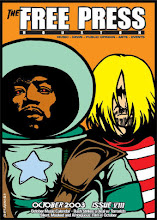Get real

Get Smart? This movie doesn't even get dumb. Steve Carell and Anne Hathaway reprise the roles of Agent 86 and Agent 99, parts played on the 60s television show by Don Addams and Barbara Feldon. Honestly, Evan Almighty and Devil Wears Prada are easier to sit through than Get Smart.
Do we really have to go back to The Fugitive for a film based on a classic TV series that works? At least Get Smart should've done what Mission: Impossible does, reinvent the concept for the present day. The original show was a satirical take on cold war politics of the day, and it wasn't even that great. Get Smart was a mainstay of the NBC Saturday night comedy block although in its final year it moved to CBS and 86 and 99 got married. The only reason I thought it was the shit was because I was nine years old at the time.
But Get Smart isn't the only airball in current release. Last week I groaned through The Promotion, a smaller almost indie film starring a quartet of known actors (Seann William Scott, John C. Reilly, Jenna Fischer and Lily Taylor) who are uniformly lost in an unfunny film. The Promotion tries to be a dramedy only The Promotion isn't quite wacky Employee of the Month bad enough, and it's not serious enough to even be Smart People lame. The Promotion does totally waste the talent of Taylor who appears speaking with a believable Scottish accent, and it recycles a gag involving thin apartment walls from Office Space.
Perhaps the biggest head scratcher in all of this is why Southland Tales, which I finally caught up with on DVD, was barely released and Get Smart and The Promotion get prime summer space. Maybe Southland Tales fails to live up to the promise of helmer Richard Kelly's Donnie Darko but at least Dwayne Johnson and Seann William Scott are in a film where you actually think they have talent. Scott painfully squeezes by in The Promotion as a milquetoast assistant store manager and Johnson plays Agent 23 in Get Smart.









